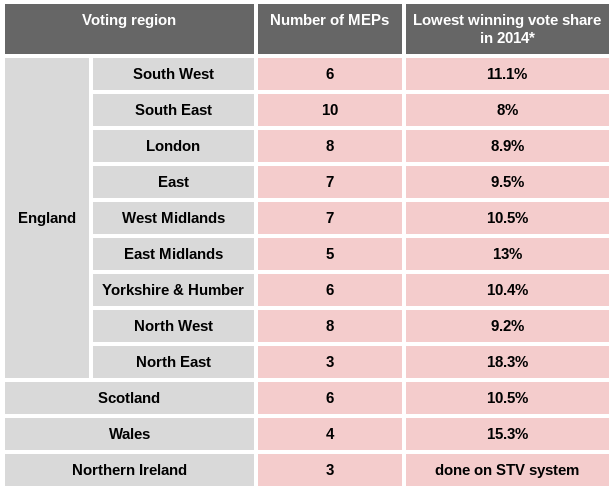While a bumper crop of pro-European MEPs would be a great outcome of the European Parliament elections on May 23, a majority of voters backing pro-EU parties is key to winning a public vote on Brexit.
The two things are not the same. Although the D’Hondt voting system used in European Parliament elections is more proportional than the winner-takes-all method used to pick British MPs, parties with too few votes still risk walking away with no MEPs at all.
This could mean fewer MEPs for the smorgasbord of parties campaigning for a public vote on Brexit – such as the Lib Dems, Greens and Change UK, plus Plaid Cymru in Wales and SNP in Scotland. They will be fighting for many of the same pro-European voters. If the vote is split, they might prevent each other winning MEPs.
A lot also depends on how Labour positions itself during these elections. In particular, will Jeremy Corbyn’s party explicitly campaign for a public vote on any Brexit outcome? This makes electoral sense, with the most recent polling suggesting that failure to court pro-European voters in this way could hand victory to Nigel Farage’s Brexit Party.
In the UK, the European elections are broken down into 12 voting regions which each elect a different number of MEPs (read more about how the vote works here). The number of votes needed to win an MEP is different in each region – essentially the more MEPs up for grabs the lower the vote share needed.
The table below shows the number of MEPs being elected in each of the 12 regions. It also shows the share of the vote that the final party to win an MEP had in the 2014 European elections, once the D’Hondt system had accounted for seats already allocated (read an explainer on how that works here).

Although the D’Hondt system seems fairer than the first-past-the-post system used in general elections, the cut off can produce some gutting results. For example, in 2014 the Lib Dems got over 10% in the South West and still didn’t get any MEPs.
No clear tactics are emerging among the major pro-EU parties over how to avoid falling foul of D’Hondt. Renew, a small pro-EU party which was set up ahead of the 2017 general election, has thrown its support behind Change UK. But similar compromises between Change UK and the Lib Dems look like a non-starter, reports the FT.
It seems inevitable that the pro-European field will be fragmented in these elections. But don’t lose heart! We should be looking beyond the number of MEPs allocated to each party and to the total vote share for all parties backing a public vote on Brexit. If a majority emerges in the country behind these parties, then we have a powerful message to send MPs as the Brexit process rumbles on without a solution into the summer.
Published and promoted by Hugo Dixon on behalf of Referendum Facts Ltd., Millbank Tower, 21-24 Millbank, London SW1P 4QP
Edited by Hugo Dixon


I get the distinct impression that the Labour Party’s internal tensions over Brexit are now starting to boil over. The Tories tensions have already boiled over.
What is interesting are the two obvious differences between the two main parties.
For the Tories it’s about self-interest ideology, and sadly it’s detached from the real world of simply looking after the majority needs and interests of the population.
For the Labour Party, it’s a combination of Corbyn’s socialist ideology whereby he’s convinced that his type of Brexit really is good for the electorate, but combined with the selfishness of MP’s in leave constituencies. Here they’re looking at their individual careers and failing to see the bigger picture. Tragic.
If Labour was able to adopt the right ‘selfish’ strategy for itself, it would do two things: propel itself to power and bring far more EU leaning people into the fold than the worry about losing others from the leave camp.
In the same way that Theresa May messed up by not understanding electoral arithmatic, Corbyn’s doing just the same thing.
Any party on the left or right just doesn’t deserve power if it doesn’t pay proper attention to the dynamics of the country as a whole.
As a hard Remainer, I am in a dilemma. Like in GE17, a vote for a good ProEU candidate from Labour would be taken as a leave vote. If I vote LibDem, Green or TIG, they might not reach the required % to get a seat.
Why is it not possible for all ProEU parties to work out a strategy whereby they stand back in areas where another of the Remain parties stands a chance?
According to You Gov, the Brexit Party’s clear name is helping it win over Leave voters.
“They’ve got very good branding – it does what it says on the tin. If you want to say ‘I support Brexit’ you’ve got a party there that is called the Brexit Party. That probably does help them in away that Change UK does not help The Independent Group.”
(Or the Lib Dems or Greens for that matter.)
Two years ago Richard Dawkins suggested that the Lib Dems change their name to the European Party
https://www.newstatesman.com/politics/uk/2017/03/richard-dawkins-we-need-new-party-european-party
but it went unheaded at the time.
Dawkins is now standing to be Change UK MEP, along with 3000 other applicants. I suppose he’s resigned to their uninspiring name, but if they had any sense they could still change it before the next referendum.